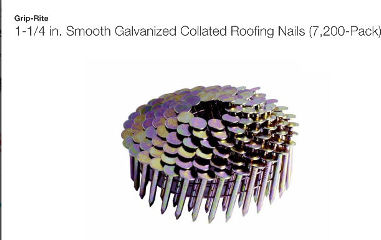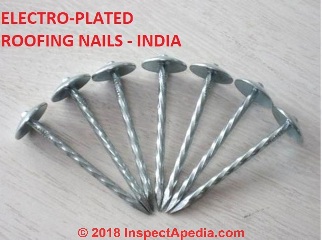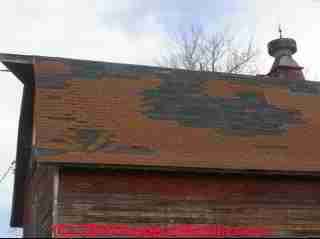 Asphalt Roofing Shingle Nail Types
Asphalt Roofing Shingle Nail Types
Asphalt Shingle Nail & Staple Choices
- POST a QUESTION or COMMENT about installing asphalt shingle roofing.
Asphalt shingle fasteners include several types and coatings of roofing nails and sometimes even roof shingle staples (not recommended).
Using the wrong shingle nail or using a type that doesn't perform well is one of several shingle nailing "mistakes" that can affect roof life. Roof shingles that are not adequately fastened to a sound roof deck are likely to blow off, as we illustrate in our photo above.
This article series discusses best roofing practices for the installation of asphalt roof shingles.
We describe asphalt shingle nailing type, size, spacing and locations. Asphalt roof shingle course offset requirements. Low slope and steep slope limits for asphalt shingles. Asphalt shingle roof flashing at eaves & skylights. Best practices for roofing material installation, flashing, ventilation, nailing, underlayment.
InspectAPedia tolerates no conflicts of interest. We have no relationship with advertisers, products, or services discussed at this website.
- Daniel Friedman, Publisher/Editor/Author - See WHO ARE WE?
Roofing Nails &* Staples
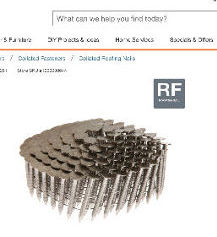 As we state in our companion article ASPHALT SHINGLE INSTALLATION - best practices,
As we state in our companion article ASPHALT SHINGLE INSTALLATION - best practices,
The preferred fastener is galvanized roofing nails with a minimum 12-gauge shank and head diameter of at least 3/8 inch.
Although staples are allowed in some jurisdictions, they do not provide the same holding power.
Image: ring shanked stainless steel roofing nails as sold at Home Depot stores.
[Click to enlarge any image]
Both nails and staples should be long enough to penetrate the roof sheathing by 3/4 inch or penetrate 1/4 inch through the sheathing if it is less than 3/4 inch thick.
Fasteners should be driven straight and flush with the shingle surface.
Hot Dipped Galvanized Nails vs Galvanized vs Electroplated vs Stainless Steel Roofing Nails
Question: Roofer used electroplated nails despite contract calling for hot dip galvanized roof nails
Perry Frogge said:
I insisted on hot dip galvanized nails on shingles, it is in the contract. I reminded the supervisor daily.
On Friday they shingled, supervisor calls to say the nails he purchased doesn't fit the guns and he is proceeding with electroplated, I told him not to, please take 30 min to get right nails.
He refused and finished the roof with electroplated.
No payment made yet. I have no confidence electroplated nails will last 20+ years, can I force roofer to strip and reroof house or do try to ask for $ now for future repairs .
If he refuses will it be up to a judge to decide.
I assume roofer will claim electroplated will last that long.
thanks
This question and answer were posted originally
Reply:
Perry,
Watch out: before suffering an issue with your roofer, be sure you have accurately identified just what type of nail he used to roof your home. As you'll read in this article there are several types of roofing nails of various coatings and materials.
Use the page bottom Comments Box to post photos of the nail boxes, labeling, data, and of the type of nail gun used if you can as that will permit us to be sure we know exactly which fastener was used.
I agree that hot dip galvanized roof shingle nails have a reputation for much longer service life than electroplated nails, and that there is a risk that your electroplated-roofing nail fastener nailed roof could face both life expectancy questions and even a possible void of the roof shingle manufacturer’s shingle warranty.
The typical life of electroplated roofing nails can be as short as 5 years or as long as 10 years before significant corrosion and loss of secure fastening of the shingles is at risk.
However if your roofer is using a Paslode straight nailer, electroplated roofing nails may be the only fastener that works with that nail gun.
The longer life of galvanized roof nails is consistent with my experience, my reading in the industry, with scholarly research, and apparently is the view of many professional roofers.
Not only is the galvanized nail more resistant to corrosion than electroplated roofing nails, its rougher surface improves nail withdrawal resistance - a factor in areas where wind damage to roofs is a concern.
Traditional rough-surfaced hot dipped galvanized nails are cleaned with an acid or solvent, then dipped twice in a hot zinc solution two times and at temperatures of 800degF or more.
Electroplated roofing nails have a far thinner anti-corrosive coating that is achieved by electrolysis, dipping current-charged nails in an electrolytic bath to plate on the coating.
However I would be stunned if any roofing contractor would agree to strip off the entire roof and re-roof with your chosen fastener to eliminate their prior use of a fastener you didn’t want.
Such a job is such a money loser the contractor is more-likely to walk away un-paid (which IMO isn’t entirely just on either account) than to face the cost of doing the roof twice for the price of one.
Watch out: a roofer who doesn’t have (in your words) 30 minutes to get the right nails was probably of the view, as is normal, that the profit in the roof job is in its speed.
The same contractor who rushes and takes one short cut may have taken other shortcuts that can also impact roof life and quality such as
- poor nailing - omitting nails, nails driven at angles, nails in wrong location, nails that cut into shingles;
- other rush examples include roofing over and depending on old flashing in poor condition,
- laddering the shingles up the roof, even damaging shingles by heavy foot traffic, and other mistakes.
The roofing nail sketch of common roof shingle nailing errors shown here is a detail from FEMA's , Asphalt Shingle Roofing for High Wind Regions [2].
This sketch points out that mis-driven nails can also lead to
Even if a contractor agreed to tear off and do-over, perhaps for some modest added contribution to the cost on your part, I’d be very worried that the irate contractor and crew would do a still more-rushed and less workmanship-like roofing job.
If you end up in court, probably small claims court, you will need to be prepared with thorough, reliable, authoritative documentation.
- Independent roof inspection & report: you may want your roof inspected by an independent expert to give you an overall state of its installation and workmanship.
- Manufacturers nail specifications: Identify the brand and specific roof shingle used (give me that information) and find the manufacture’s installation instructions and their statement about which types of fasteners are acceptable or recommended.
Include any warning about impact on warranty of improper fasteners or other installation errors. - Authoritative reports on life of roof nails & impact on roof life - see references given below for some examples
Keep in mind that few professional roofers are still nailing shingles by hand except perhaps on very small repair jobs. Most use a roofing nailer, either straight or coil nail type gun.
List of Roofing Nail Types & Coatings
- Double hot dipped roofing nails will not work in and are not sold for use in coil nailers - they won’t run through the gun. These nails are hammered by hand.
- Smooth galvanized roofing nails are sold for coil nailers as are another option only more expensive, stainless steel roofing nails.
An example of smooth galvanized roofing nails sold in coils for roofing guns are the Grip-Rite nails sold at Home Depot and shown here. - Smooth galvanized roofing nails 1 1/4” roofing nails sold in coils in a 7,200 pack at Home Depot retail for about $25. U.S. ($0.03 /nail)
- Stainless steel ring-shanked roofing nail 1 1/4" coils in a 600 pack by Home Depot retail for about $30. U.S. ($0.20 / nail)
These stainless steel roofing nails are sold in a ring-shanked form to improve resistance to withdrawal. - Copper roofing nails of various lengths are used primarily in slate roofing, copper sheet metal work, and when nailing copper flashing or other copper sheeting or components to the structure.
Don't use galvanized or electro-plated nails when nailing copper.
Longer nail lengths are needed for multi-layer roofs and other circumstances.
Below: an "electro galvanized" roofing nail from Grip-Rite.
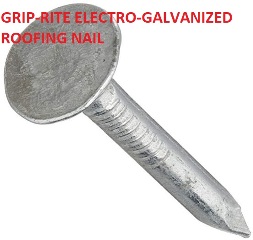
Compare Thickness of Electro Galvanized Nail Coatings with Hot Dipped Galvanized Nail Coatings
Electroplated / Electro-galvanized zinc plated roofing nail coating thickness: typically 0.36 mils or ranging from 10-30 microns thick.
The anticipated "time to first maintenance" or actionable deterioration is 5-10 years or a bit more. Electroplated nails are suitable for indoor use.
Above: Electro-Plated "roofing nails" sold in India.
Hot dipped molten zinc plated galvanized roofing nail coating thickness: no less than 1.7 mils - that's mils not microns.
The anticipated "time to first maintenance" or actionable deterioration is 35-55 years or a bit more for hot dipped zinc galvanized nails.
Mechanically plated or Peen Plated Zinc plated nail coating thickness: 1.5 mils of effective thickness with actual coating thickness ranging from 0.2 to 4.3 mils depending on time in the tumbler.
The anticipated "time to first maintenance" or actionable deterioration is 10-15 years or a bit more for Peen plated zinc coated nails.
Roof Nail Coating Thickness Comparison
One mil (1/1000 of an inch) = 25.4 microns.
So a 1.7 mil hot dipped galvanized coating = 43 microns of thickness - up to 4 times thicker than the anti-corrosive coating on an electroplated nail.
Source: American Galvanizers Association 2019, cited below.
Roof Shingle Staples
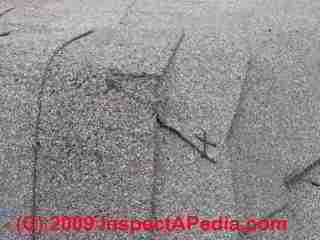 Roofing staple guns have been sold for nearly 40 years and in some models including the one I liked, are still available, such as the Stanley Bostitch 16-Gauge Wide Crown Roofing Staple Gun, shown
Roofing staple guns have been sold for nearly 40 years and in some models including the one I liked, are still available, such as the Stanley Bostitch 16-Gauge Wide Crown Roofing Staple Gun, shown
at ASPHALT SHINGLE STAPLE vs NAIL.
That stapler might also be used for securing house-wrap and other building materials.
While staples remain an acceptable shingle fastener on manufactured housing, staples are not an approved shingle fastener in most current residential building codes. - (Donan retrieved 2017)
Excepting comments such as by Donan, our review (September 2017) did not find a building code nor a roofing shingle manufacturer explicitly recommending the use of staples to secure asphalt roofing on residential structures.
FEMA specifically recommends the use of roofing nails, not staples in high wind areas.
Watch out: the following is an excerpt from a GAF Technical Advisory Bulletin warning about the use of staples to secure asphalt shingles:
Staples are not recommended by GAF and most industry organizations ...
Details about roofing using staples and staple guns are at ASPHALT SHINGLE STAPLE vs NAIL
Really? Interestingly, in some applications such as nails for treated wood, the electroplated nail may perform better than a galvanized nail ( Zelinka 2009).
References & Research on Roofing Nail Type, Nail Life, Requirements vs Roof Life & Warranty
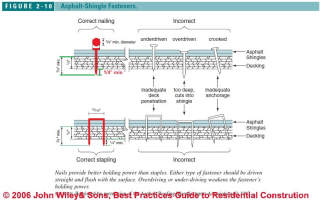 Illustration shown here is used in ASPHALT SHINGLE INSTALLATION with permission from Best Practices Guide to Residential Construction, chapter
Illustration shown here is used in ASPHALT SHINGLE INSTALLATION with permission from Best Practices Guide to Residential Construction, chapter
on BEST ROOFING PRACTICES documents that same shingle nail or staple penetration, and thus length, requirement.
[Click to enlarge any image]
Both nails and staples should be long enough to penetrate the roof sheathing by 3/4 inch or penetrate 1/4 inch through the sheathing if it is less than 3/4 inch thick.
- American Galvanizers Association METHODS USED to COAT NAILS WITH ZINC [Web article], American Galvanizers Association 6881 South Holly Circle, Suite 108 Centennial, Colorado 80112 USA Phone: 720.554.0900 Email: aga@galvanizeit.org, retrieved 2018/12/22, original source: https://galvanizeit.org/education-and-resources/resources/technical-faq-dr-galv/specified-nails
- Bonafont, Roger L. "Application of Performance Concept in Evaluation, Specification, and Selection of Roofing Materials." In Proceedings, pp. 70-85.
Original source: docserver.nrca.net/pdfs/technical/250.pdf - Countryman, David. "Fastening of Roofing to Plywood." In Mechanical Fasteners for Wood: Report of a Program Held as Part of the BRI 1961 Fall Conferences, no. 1003, p. 8. National Academies, 1962.
- ARMA - Asphalt Roofing Manufacturer's Association - https://www.asphaltroofing.org/
750 National Press Building, 529 14th Street, NW, Washington, DC 20045, Tel: 202 / 207-0917 Web: https://www.asphaltroofing.org/
Asphalt Roofing Manufacturers Association (ARMA), Public Information Department 750 National Press Building 529 14th Street, NW Washington, DC 20045 Tel: (202) 591-2450 - ASPHALT SHINGLE ROOFING for HIGH-WIND REGIONS [PDF] (2004) FEMA, Hurricane Recovery Advisory,
- ASPHALT SHINGLE ROOFING FOR HIGH WIND REGIONS, HOME BUILDERS' GUIDE TO COASTAL CONSTRUCTION [PDF], FEMA 499, August 2005, Technical Fact Sheet No. 20.
- Bolt, Steven, Roofing The Right Way, McGraw-Hill Professional; 3rd edition (November 1, 1996), ISBN-13: 978-0070066502, p. 350 for one of many citations on this point.
- Bonafont, Roger L. APPLICATION of PERFORMANCE Concept in Evaluation, Specification, and Selection of Roofing Materials [PDF] In Proceedings, pp. 70-85. Original source: docserver.nrca.net/pdfs/technical/250.pdf
- Dixon, Craig Robert, THE WIND RESISTANCE OF ASPHALT ROOFING SHINGLES, [PDF] (2013 Dissertation thesis), University of Florida, retrieved 2017/09/27, original source http://ufdc.ufl.edu/UFE0046235/00001,
Excerpt:
Florida Building Code (2010), Building Commission 2010) requires that fasteners should consist of:
Galvanized steel, aluminum or copper roofing nails, minimum 12 gage [0.105 in (3 mm)] shank with minimum 3/8 in (10 mm) diameter head, ASTM F 1667, of a length to penetrate through the roofing materials and a minimum of ¾ in (19 mm) into the roof sheathing.
Where the roof sheathing is less than ¾ in (19 mm) thick, the fasteners shall penetrate through the sheathing.
Florida Building Code also requires a minimum of four fasteners per strip, and, where the structure is within the High-Velocity Hurricane Zone (Broward and Miami-Dade, FL counties), a minimum of six nails are required (Florida Building Commission 2010). Fasteners are either placed by hand or pneumatic air pressure guns. - Falk, Bob, and Sam Williams. "Details for a Lasting Deck." Fine Homebuilding (1996): 78-81. Original source: www.fpl.fs.fed.us/documnts/pdf1997/falk97d.pdf
- "GAF-Elk Timberline ® Prestique ® Grande ® 40 High Definition Roofing Shingles Product Information" (2008) GAF-Elk Corporation 5/08 13 61 Alps Road, Wayne, NJ 07470 www.gaf.com, retrieved 9/8/2014, original source: http://www.gaf.com/Other_Documents/ Legacy_Products_Discontinued/Timberline_Prestique_Grand%C3%A9 /Timberline_Prestique_Grande_40_Info_Spec_Sheet.pdf [Note that this is a discontinued product]
- GAF Materials Corporation, Grand Timberline Premium Architectural Shingle Application Instructions.
http://www.gaf.com/Content/Documents/20573.pdf discusses the requirements for successful asphalt shingle installation including the condition of the roof deck, the use of roofing felt underlayment, the selection of roofing nails by type and length and penetration of the roof decking, and the role of glue strips on the back side of asphalt roof shingles. - Maze Nails, Hot-Dip Galvanized [nail] Specifications, retrieved 2018/12/23, original source https://www.mazenails.com/resources/hot-dipped-galvanized-nails-specs
- NRCA - National Roofing Contractors Association - Website: www.nrca.net 10255 W. Higgins Road, Suite 600, Rosemont, IL 60018-5607, Tel: (847) 299-9070 Fax: (847) 299-1183
- Stern, E. George, and Virginia Blacksburg. "Better construction with threaded nails." Bulletin 25 (1956).
Mr. Stern was director of the Wood Research Laboratory at Virginia Polytechnical Institute. - STERN, E. GEORGE. "Recent Improvements in Nail Design." The Military Engineer 44, no. 297 (1952): 46-47.
- Stern, Ernest George. The Nail: An Indispensable Fastener. No. 18. Virginia Polytechnic Institute, Wood Research Laboratory, 1951.
- Walsh, J, PREDICTING the SERVICE LIFE of natural roofing slates in a Scottish environment [PDF] In 9th international conference on durability of building materials and components, CSIRO Australia, Brisbane, Paper, vol. 216. 2002. Original source: www.irbnet.de/daten/iconda/CIB10044.pdf
- Zelinka, Samuel L., and Douglas R. Rammer. "Corrosion rates of fasteners in treated wood exposed to 100% relative humidity." Journal of Materials in Civil Engineering 21, no. 12 (2009): 758-763.
Abstract Excerpt:
In ACA and ACQ treated wood, the electroplated galvanized fastener had a lower corrosion rate than the hot-dip galvanized fastener.
...
Continue reading at ASPHALT SHINGLE INSTALLATION - best practices, or select a topic from the closely-related articles below, or see the complete ARTICLE INDEX.
Or see these
Recommended Articles
- ASBESTOS CEMENT ROOF REPAIR - more about the stapled asbestos cement roof shown in this article
- ASPHALT SHINGLE INSTALLATION
- ASPHALT SHINGLE LIFE / WEAR FACTORS
- ASPHALT SHINGLES on LOW SLOPE ROOFS
- ASPHALT SHINGLE STAPLE vs NAIL
- SHINGLE EXPOSURE AMOUNT
- ASPHALT ROOF SHINGLES - home
- WARRANTIES for ROOF SHINGLES
- WIND DAMAGE to ROOFS - describes asphalt shingle damage and shingle loss where improperly-stapled shingles were installed on roofs
Suggested citation for this web page
ASPHALT SHINGLE NAIL TYPES at InspectApedia.com - online encyclopedia of building & environmental inspection, testing, diagnosis, repair, & problem prevention advice.
Or see this
INDEX to RELATED ARTICLES: ARTICLE INDEX to BUILDING ROOFING
Or use the SEARCH BOX found below to Ask a Question or Search InspectApedia
Ask a Question or Search InspectApedia
Questions & answers or comments about the best practices to follow when installing asphalt shingle roofing..
Try the search box just below, or if you prefer, post a question or comment in the Comments box below and we will respond promptly.
Search the InspectApedia website
Note: appearance of your Comment below may be delayed: if your comment contains an image, photograph, web link, or text that looks to the software as if it might be a web link, your posting will appear after it has been approved by a moderator. Apologies for the delay.
Only one image can be added per comment but you can post as many comments, and therefore images, as you like.
You will not receive a notification when a response to your question has been posted.
Please bookmark this page to make it easy for you to check back for our response.
IF above you see "Comment Form is loading comments..." then COMMENT BOX - countable.ca / bawkbox.com IS NOT WORKING.
In any case you are welcome to send an email directly to us at InspectApedia.com at editor@inspectApedia.com
We'll reply to you directly. Please help us help you by noting, in your email, the URL of the InspectApedia page where you wanted to comment.
Citations & References
In addition to any citations in the article above, a full list is available on request.
- In addition to citations & references found in this article, see the research citations given at the end of the related articles found at our suggested
CONTINUE READING or RECOMMENDED ARTICLES.
- Carson, Dunlop & Associates Ltd., 120 Carlton Street Suite 407, Toronto ON M5A 4K2. Tel: (416) 964-9415 1-800-268-7070 Email: info@carsondunlop.com. Alan Carson is a past president of ASHI, the American Society of Home Inspectors.
Thanks to Alan Carson and Bob Dunlop, for permission for InspectAPedia to use text excerpts from The HOME REFERENCE BOOK - the Encyclopedia of Homes and to use illustrations from The ILLUSTRATED HOME .
Carson Dunlop Associates provides extensive home inspection education and report writing material. In gratitude we provide links to tsome Carson Dunlop Associates products and services.



